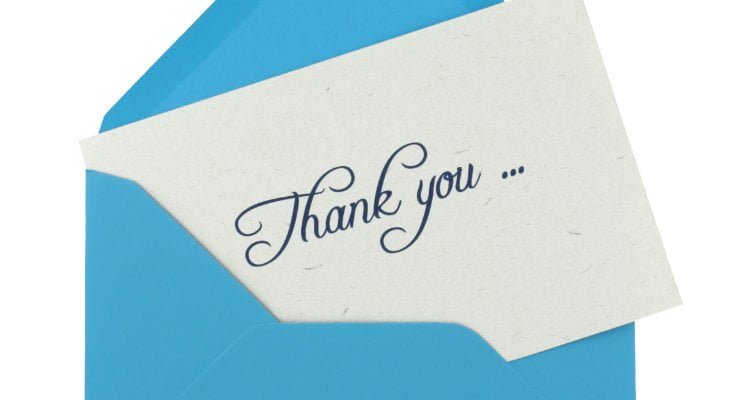No one wants to receive a generic thank you note, and most often, they end up in the trash.
After an interview, your thank you note can make or break whether you get the position. I know it might sound fluffy, but I’ve seen hundreds of people get passed over because they neglected this crucial step.
In our world of Instagram Stories and Facebook Live, things move fast, and you might feel like a thank you note to your prospective boss will go unnoticed, and might even annoy them.
Not true.
Sending a well-thought-out thank you note could be the deciding factor in whether you land your dream job.
You can leverage your thank you note to distinguish yourself, be truly memorable, and show your gratitude to the hiring manager for taking the time to meet with you.
But how do you do it without coming off as generic and robotic?
Today I’m going to guide you through an 8-part system to craft a killer thank you note without spending an hour on it… even if you don’t consider yourself a writer (or evenhatewriting), and only have 20 minutes to spare.
Let’s get right into it…
1.Be timely, and hit ‘em from two angles.
Candidates often ask if they should send their thank you note via email or snail mail, and the answer is BOTH.
The same day of your interview, send a thank you note via email. Within 24 hours, send a handwritten letter out, and use high-quality stationary.
Email is especially crucial if you know your manager has a time-sensitive decision to make.
Your handwritten thank you note, which will likely arrive a few days after your email, is a great reminder to the manager, and sets you apart from the crowd.
Warning: Do not treat your thank you email more casually than your handwritten letter.
Give it the same amount of thought and time. The most professional approach is to attach your note as a Word doc in an email.
2.Address the individual.
Simple – use the person’s name.
If your potential manager’s name is Linda, start the thank you note with “Dear Linda,”
This already makes the person feel appreciated, even if only subconsciously.
I can’t tell you how many thank you notes I’ve received that didn’t even include my name –supergeneric, as if the person printed out a whole bunch of the same ones without bothering to put in names.
3.Content rules.
Your thank you note is an opportunity to express gratitude, but it’s also a way to resell yourself and reiterate what a great fit you are for the position.
Restate your enthusiasm for the job, your professionalism and understanding of business procedures, and 1-3 of your strongest skills that apply to the company, department, and role.
Be specific while keeping important big-picture components in mind. How do you fit in with the overall company cultureandhave the skills for the individual role?
Prospective employers are looking for that spark and energy that tells them you genuinely want the job, and aren’t just reaching for a paycheck.
4.Include details.
To give your letter a personal touch, bring up particular points from the conversation(s) you had with the hiring manager(s).
For example, if a prospective employer mentioned multiple times that the position calls for strong knowledge of programmatic media, use your thank you note as an opportunity to remind them you have “3+ years focusing on programmatic”.
5.Add in something personal, and write more than one letter if necessary.
Many employers now involve multiple people in the hiring process to get a well-rounded view of applicants.
If you interviewed with a few different people, yes, you need to write a personalized note to each person.
Address each person by name and include examples that apply to them, even if it’s just that you went to the same college and established common ground on that during the interview.
Even if you have to do some research to uncover the spelling of someone’s name or locate his or her contact information, it’s 100% worth your time. Make sure the content of each letter differs, at least slightly; hiring managers often compare notes – literally. And please avoid any spelling errors in general – we have seen many candidates be passed on due to ONE simple spelling error in a thank you note.
6.Proofread, spell-check, and get a second set of eyes.
We recommend reading through your note at least three times, then running spell-check.
BONUS pro tip: Read your thank you note out loud. This helps so much in catching any awkward phrases, and makes your letter natural and genuine.
In addition, we always have our candidates send their thank you emails and letter copy to us first, so we can give a second opinion. We’ve caught hundreds of errors that could’ve jeopardized so many jobs.
7.Close strong.
It’s a great idea to close out with a specific detail or slightly-personal remark to set yourself apart.
If a manager casually mentioned they’re going on a vacation to Hawaii next week, you might simply say,“Have a wonderful time in Kauai, and I look forward to connecting when you get back!”
Showing that you remember particulars like this sets you apart as someone who’s thoughtfulanddetail-oriented – traits that serve you inanyjob, and often lead to promotions.
8. Don’t lose hope.
Even if you feel like you had a terrible interview, it’s still wise to send a thank you note.
We’re often far harsher on ourselves than anyone else, so your opinion of the meeting might be much worse than the hiring manager’s.
In fact, they might have thought it went GREAT – seriously. Our individual perceptions of ourselves can bethatoff sometimes, especially in high-pressure situations where we’re a little nervous.
In addition, showing courtesy and professionalism through a thank you letter will work in your favor if you cross paths with the person again, or another opening arises within the company.
Here’s a quick checklist of what your thank you note should include…
✓A genuine thank you for their time.
✓An expression of your interest and enthusiasm. Be direct and authentic!
✓Why you’re a good fit.
✓What you can contribute, and how your track record proves that.
✓Specific references to key points discussed in the interview.
✓Restatement of your follow-up agreement. What are the next steps?
Do you struggle with thank you notes, or writing in general? Are you guilty of sending out generic notes? If so, don’t beat yourself up – no one is perfect, and there’s no better time than now to hone this crucial skill.




